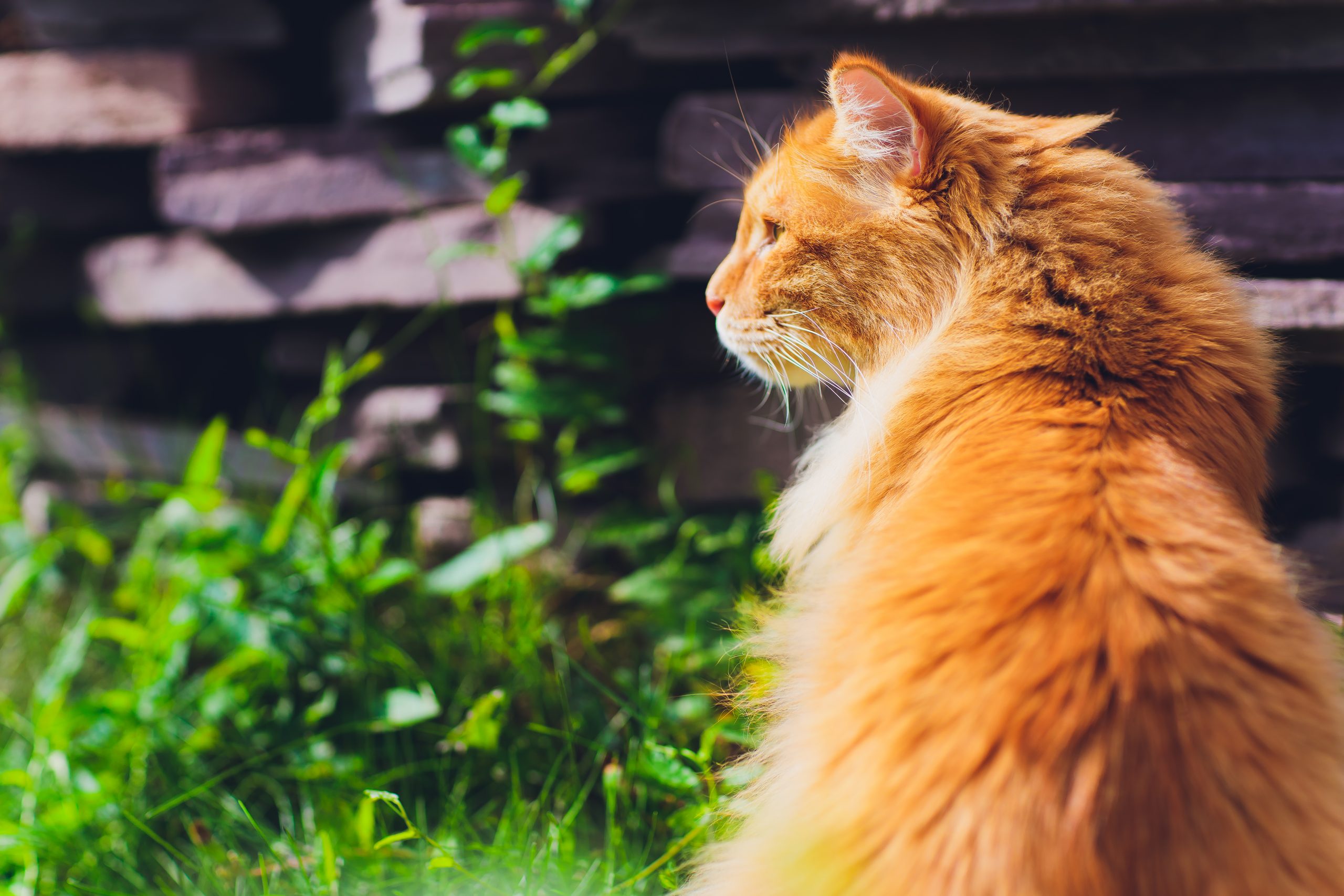
Where the Mild Things Are
By Jim Dodson
These midsummer mornings are the ones I like best, the last cool, wet mornings in my garden before dawn, when plants are at their peak and months of toil pay off with blooms and foliage that will surrender soon enough to the heat and drought of August.
Even if I didn’t rise unnaturally early by most of the world’s clock, I would be out poking and spading, weeding and watering plants before anyone groggily rises — all under the steady gaze of the garden’s most vigilant creature.
No one knows exactly how old Old Rufus really is. Or even where he came from.
He showed up one day many years ago at the college where my wife works, politely cadging food off the staff. “He was well-fed and very friendly, clearly belonged somewhere and to someone,” Wendy explained after finding no takers over the course of a week and finally hauling him home. “I think someone must have dumped him.”
None of our three dogs was initially impressed. Come to think of it, neither was I. The first time I tried to give the newcomer a friendly scratch on his rump, he spat at me and nearly took off my hand. I suggested we dump him at the college.
“Funny who he looks like,” my wife added with a wry smile.
The resemblance to a mellow old barn cat we had in Maine named Rufus was uncanny. He was a fluffy orange tabby with a pinch of Maine Coon cat in him, a gentle disposition and face like a miniature lion, born in the rafters of a 200-year-old barn with a rambunctious twin we named Wexel.
Both cats lived with us — or the other way around — for two decades, becoming my constant companions whenever I cut grass or worked in the flowerbeds. Rufus was particularly loyal in the garden. His favorite places to snooze on a summer day were either my prized Italian coneflowers which came indirectly from Katharine White’s Blue Hill garden or a patch of wild ferns by the edge of the woods. I nicknamed Rufus the Guardian of the Garden, even if he was no good at catching slugs and slept on the job much of the time. Others eventually called him the miracle cat.
One day Rufus the First disappeared and didn’t return for almost a week. I found him lying beneath a hydrangea bush by the side porch steps filthy and panting, barely alive. He’d been split open from throat to gut by some critter of the north woods, probably a coyote he mistook for a friendly dog. You could actually see his heart beating beneath his exposed ribs. Our vet gasped when she saw him, pointing out it would be a miracle if Rufus lasted the night. “But we can clean and sew him up and see what happens.” Two days later, Sue phoned with an update. “You won’t believe it, but I think he’s going to pull through. Cats will always surprise you.”
Ten days later, Rufus came home again, happy as ever, stitched up like a second-hand football — and lived another five years happily following me about the yard and garden before I simply found him on another late summer afternoon stretched out peacefully beneath the same hydrangea bush, having serenely departed on his own gentle terms.
I buried him in the wild ferns where he loved to nap, marked by a simple granite stone.
We decided to name the newcomer Rufus the Second. He gradually warmed up to me, though anytime I touched his back he turned into Psycho Cat. We decided someone must have abused him, perhaps explaining why he turned up as a refugee at the college. Within days of his arrival, though, he was following me around the house and soon outside where I was restoring a neglected terrace garden.
One evening as I was transplanting hostas, I saw him hop the fence and disappear into our neighbor’s vast overgrown yard. Rufus the Second was obviously a born traveler, perhaps happy to have a meal and keep moving.
But the next morning he was back, calmly waiting outside the terrace doors for his breakfast. I fed him outside and went to water my new rose plantings. Rufus Two followed and began licking the hose water off the leaves of the freshly watered plants.
This quickly became our morning and evening routines. By the light of dawn or dusk, I would spade and mulch and water; Rufus would follow closely behind, drinking from the leaves, monitoring my progress. Like his remarkable namesake, he clearly preferred to eat and sleep outdoors, coming inside only on the coldest nights or anytime there were houseguests or a dinner party going on, saving his rock star charm for strangers.
Many mornings he even left a token from his nighttime travels, a small mouse or mole at the back door. Unlike his gentle namesake, this Rufus was a killer, a true guardian of the grounds.
“Earning his keep,” suggested my wife, his savior.
People who like cats tend to love cats. Generally speaking, I’m not one of them, decidedly a dog-loving human, though beginning with our barn cat brothers in Maine, I’ve developed a grudging affection for a handful of cats.
A spiritual writer I admire insists that every philosopher needs a cat, a non-judging set of eyes to monitor your progress through this beautiful but challenging world.
For what it’s worth, I’ve learned — decided — every gardener could use a cat in the garden, too — a living companion who observes what you do without particular judgment and the calm detachment of a Buddhist elder.
A couple years after Rufus the Second arrived on the scene, we downsized to an arboreal cottage that felt like the first true home we’d had since leaving Maine. I wasn’t entirely sure if Rufus the Second would — or could — translate.
The new place was truly an overgrown arboretum of ancient pond pines and gorgeous mature gardenias and camellias, dogwoods and Japanese maples and wisteria vines run amok, a garden that had been allowed to grow on its own for almost a decade. More than anything else, it needed love and the attention of a full-time gardener, a task that gave me incalculable pleasure.
The new property was also home to a spectacular variety of birds, not exactly the place you want to introduce a known killer like Rufus the Second.
To be on the safe side, we put a bell on him, which he promptly ditched somewhere and — a day or so later — vanished.
He was gone for several days, prompting me to think maybe his wandering blood had just kicked in again.
By then I was busy constructing gates and fences and starting a new stone walkway framed by Russian sage, hydrangeas and Italian coneflowers, quietly hoping the guardian of the garden might eventually return.
I discovered he was spending time with the nice widow lady next door and charming an elderly couple who lived through the trees behind our saltwater swimming pool, perhaps auditioning for potential new owners.
“What a wonderful cat, so beautiful and friendly,” cooed my neighbor, the widow lady. “I call him Simba because he looks like a little lion.”
The next morning Rufus was back, reporting for duty in the garden.
With the help of a talented gardener named José, we dug out ancient dying shrubs and created new perennial beds and recovered a beautiful serpentine brick wall which I spent much of the late winter and early spring re-planting. As José went after banks of azaleas and camellias-gone-wild, I landscaped the pool area and hacked away at the murderous wisteria vines that make parts of the property still resemble Jurassic Park.
Throughout this ambitious process of restoration, the new Old Rufus settled into his familiar routine, never venturing farther than the pool (when people are in it) or the nice widow lady next door (when he needs a second meal), presumably having decided to call my garden his permanent home. Better yet, he’s grown too old to chase the birds — seems content to simply lie and merely watch them at the feeder.
There he presides to this day, faithfully waiting at the back door in the cool dawns of our second summer for his breakfast, or curled up in the heat of the summer afternoons in the cool thick tufts of liriope muscari near a stone Buddha head beneath the young Japanese maple, waiting for me to begin my evening weeding and watering. Before we start work, I always give him a nice scratch — on the head, mind you — to thank him for his faithful companionship.
He’s grown visibly thinner. Someday, I’m guessing, I’ll find him stretched out peacefully beneath a handsome garden plant, having finished his work and set off on a different kind of journey.
I plan to put him someplace nice in the garden — hoping someone will someday do the same thing for me — not discounting the possibility that all living things, including gardens and their guardians, have a lovely way of always returning.
Reprinted with permission from the July 2015 issue of Pinestraw Magazine.





